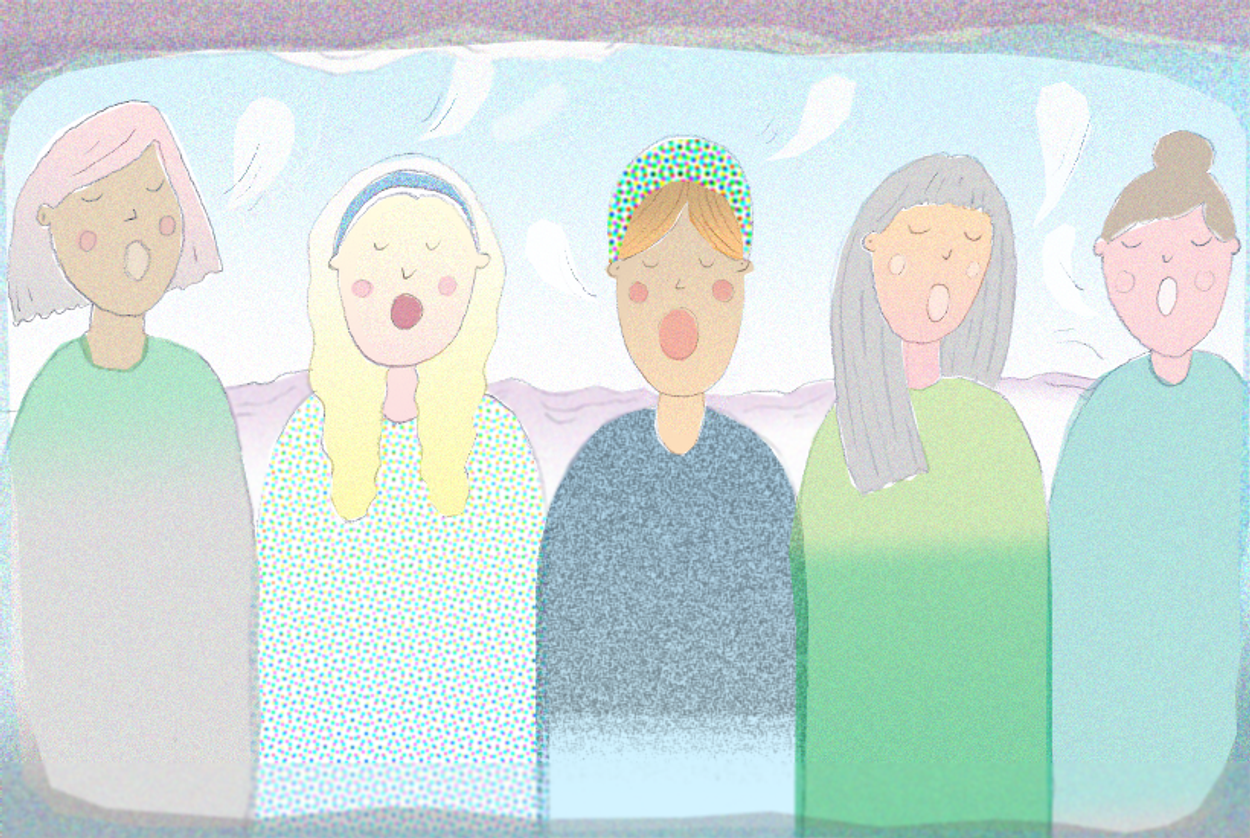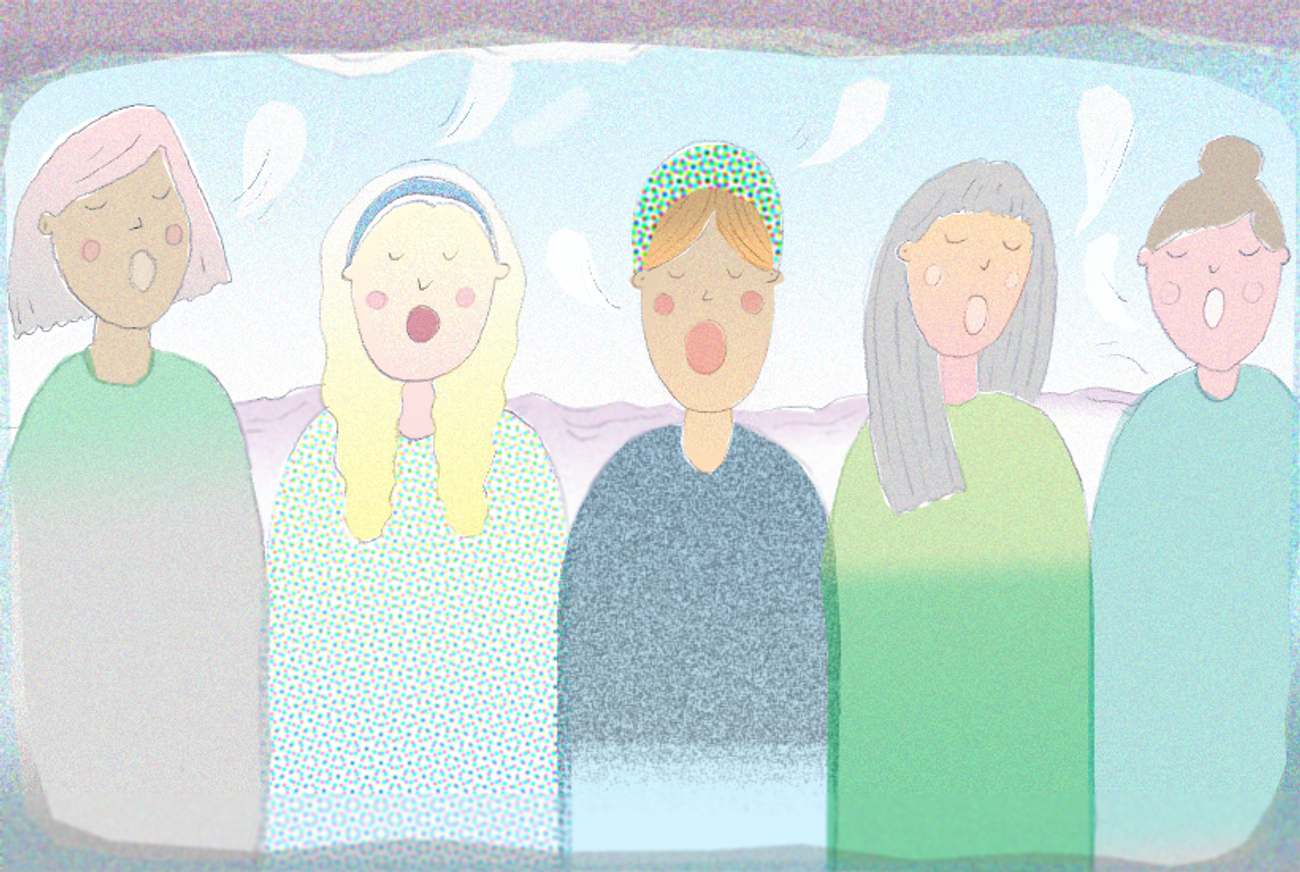Becoming Religious Meant Giving Up What I Loved Most—Singing
In Israel, women-only performance groups fed my spirit after years of self-imposed sacrifice




I was born to sing. Even the nurse hired to help my mother in the early days after my birth remarked on my low voice. At 4, I would sing along with whatever my mother had on the turntable or car radio—Sinatra, Streisand. At 13, I won the role of Bill Sykes in a summer camp production of Oliver because our drama director—Elizabeth Himelstein, who’d later become voice coach to the stars—said I was good; I got a long solo, and I got to die on stage.
Singing in front of an audience made me high. It was the bug that bit me. I thrilled to my own voice. There was almost nothing else.
I started my music education at age 8, playing piano. Soon I added violin and then drama classes at the Pittsburgh Playhouse. I picked up guitar. Music was nearly everything, and when I turned 16 I got an audition to study voice with the best singing teacher in the town. I sang “Twisted.” I grabbed every opportunity to perform: old-age homes, school plays, anything, as long as I could sing.
It seemed I had finally hit upon “my instrument.” A true contralto was rare and marketable. My voice range was less common still. I was a tenor.
I thrilled to the sight of mouths dropping open when I hit those impossibly low notes (low for a girl, anyway). Singing was music and drama at the same time. It was my heart expressing itself. It was me.
I’d found my niche, or rediscovered it. But in those early teenage years, something else was going on in my life, too. Something that would ultimately put a singing career out of bounds. I’d been bit by a different bug: religion.
Raised “Conservadox” in Pittsburgh, I started at 13 to delve into Orthodoxy, eventually becoming deeply religious.
In the Orthodox world, men are forbidden to hear kol isha, a woman’s voice in song, unless she is a wife or close relative. As a I delved deeper into the ins and outs of halakhah, and moved from Modern Orthodoxy to ultra-Orthodoxy, I realized I had to stop singing in front of men. I had to give up the stage altogether, since finding all-women audiences was nearly impossible.
Giving up singing was a challenging process. It was altogether different from keeping Shabbos or giving up pepperoni. Not singing meant giving up ME, the voice inside me that needed to get out. For a time, at that time, that was OK. I liked the sacrifice. The pain of it felt good, since I was doing something real to show I meant business. I was invested in keeping the commandments so perfectly that no one could find fault with my performance.
And in fact, it was a performance, albeit of a different sort. Here, I was performing for God alone.
Still, there was a loneliness, an ache deep inside. God was a difficult audience. The vanity of my inner performer was chafing at this new suppression. I missed the applause, the adulation, and I wrestled with my ego. If my singing came from a pure place, why did I need an audience to affirm me? Through this internal debate, I finally convinced myself that giving up singing was good for my middos, my character, my soul.
Maybe that’s why I never questioned the rules. I didn’t need to find an easy way out, a heter that would allow me to sing in a group of women or through a sound-distorting mic that would render my voice less authentic and therefore, in the eyes of some modern rabbis, permissible to hear. I was not, am not, bothered by the notion that my voice has a power and that men are susceptible.
Still, through my teens, as I struggled with accepting the sacrifice I made, I wondered why God blessed me with a voice. Was it to test my resolve—to see if I would stay Torah-observant no matter the trials I encountered? Would I stay Torah-true in the face of yearning to sing? Or was I completely off-base in my interpretation of God’s will? Was my voice meant to be used somehow, a gift?
I pushed the thoughts away and tried to think of other things, do other things, but singing wanted me as much as I wanted to sing. At a girlfriend’s home one day, I sat at the piano and the two of us, Helene and I, sang—just for fun. By then I’d finally altogether stopped singing in front of men. Helene’s sister Julie walked in and said, “You’re good.” A glimmer of the thrill of performing flickered inside me, even though by then I’d made my commitment not to sing in front of men. Neither Helene nor Julie knew that, or knew of the kol isha concept, and Julie handed me her husband’s card, saying, “He’s shooting a commercial next week and we need another alto.”
I simply thanked her for the card and said I’d think it over. Her husband was an award-winning composer. Other singers would have killed to audition for him. In my pocket, I fingered the edges of his card for a week, until they were ragged. Then I ripped it into four small squares and tossed them away.
Singing was officially behind me. I took a cleansing breath, to empty myself of the notes. I would live without song.
***
Two years later, I left the United States to attend a seminary in Israel. I got married, had many babies, and moved to an isolated Haredi settlement in Judea. I sang for my children. I sang for myself. But mostly, for years, I didn’t sing at all.
Our settlement failed. We packed up our 12 children and moved to Efrat, a town a short distance away but worlds apart from the isolation of the settlement. Efrat was different. It was modern.
Efrat had an all-female a capella group, and the word was out that the group needed an alto.
It needed me.
I was cleaning houses for a living. The choir director was a client. I asked her for an audition. She put me off, thinking that her bedraggled maid, the lady with that large, likely poor family couldn’t possibly have any real musical background or potential.
I didn’t give up. One day after I finished cleaning her home, I asked again. “Can I audition for you?” She humored me—much like the prince’s servant in Cinderella, not really believing that slipper would fit—sat down at the piano, and played scales to get an idea of my range. She went bug-eyed. “Sing ‘Old MacDonald,’ ” she instructed, and I sang it low and sexy. “You have the voice we want,” she declared.
Decades after giving up singing, at age 42, I was singing again. I was a soul freed from a prison of my own making. At last, I was me. The me that no one knew all those years. The me that was hiding inside the wife and mother, behind the apron, beyond the head coverings, high necklines, and stockings.
Shir A Capella performed mostly at benefits, for free. And after a nice run, the choir broke up, and I found myself back where I started: without music, hungry for expression. Having unleashed this creative force, I could not again restrain it.
I would hear about choirs forming or choirs looking for altos, but they were always mixed, men and women singing together. Forbidden to me. Once there was an all-female group starting up. I was excited, until I heard the cost of participation. There was no way we, my very large family, could afford that.
Then, four years ago, a local women’s theater troupe called Raise Your Spirits that performs before exclusively female audiences advertised auditions for a new show. I prepared a song, but when I got up to perform, I was, for the first time in my life, overcome with nervousness. I’d picked the wrong sort of song.
I’d picked a ’40s jazz standard, “I’m Beginning To See the Light,” but it wasn’t that kind of crowd. The people I was auditioning for wanted ABBA, or perhaps Carlebach. I faltered as soon as the first notes left me. I felt exposed, naked. I had feared rejection and jinxed myself.
It happens.
They offered me a bit part. I politely turned it down. The director was surprised. She had thought she was delivering good news. I had a background, I explained, and training, and the offered role seemed, well, beneath me.
She heard me out and told me to prepare something else for the callbacks. This time I sang “Don’t Let the Sun Go Down on Me,” a song I knew cold. By the time I got to the end, I had that audience in the palm of my hand. One woman swayed, holding up a pretend cigarette lighter. There was wild applause. But my musical accompaniment continued, so I continued, too; I sang “Twisted,” And when I came to the lyric, “Do you think I was crazy?” the music director gleefully called out, “Yes!”
I snagged a lead.
It would have been enough to have a chance to sing again, to perform in a way that doesn’t disturb the heavens or the men who live beneath them. But the troupe opened a world for me: a world of sisterhood that I never knew I was missing. There is a sort of kinship that comes with being a member of this group. A spiritual fellowship and one of friendship, too.
We recite psalms at the beginning of each rehearsal. If I am feeling down, a fellow performer might move close and hold my hand for a bit, knowing intuitively that this is something I need. There’s the smell of the greasepaint, the roar of the crowd, and then there are my sister performers, my newfound friends.
If I had not once lived in the secular world, I wouldn’t know half as much as I do about singing and music. But now, I’ve found my niche: a place where religion, song, and my past blend together in a harmonious whole. For so long, I thought there was no way to use my voice. In deference to faith, I had put it up high on a shelf and tried to forget it was there. But it kept calling to me pushing me to find something, anything, that would allow me to sing. Now I’ve found it, and I am whole.
***
Like this article? Sign up for our Daily Digest to get Tablet Magazine’s new content in your inbox each morning.
Varda Meyers Epstein is a parenting education blogger at the Kars4Kids blog.
Varda Meyers Epstein is a parenting education blogger at the Kars4Kids blog.